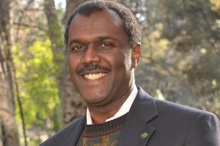

Stephen H. Lockhart is being honored as a Next Generation of Conservation Leaders Champion of Change.
Why must we create the next generation of Conservation Leaders? A sustainable future for our planet requires that our young people both know and love the natural world. A connection with nature, if created early, will endure and deepen over a lifetime. Certainly this was my experience.
Introduced to nature as a Boy Scout in a segregated troop in the Midwest, my time spent outdoors was invigorating, liberating, and educational. It instilled a sense of personal confidence as well as a responsibility to protect these amazing natural resources. These experiences created an abiding love and respect for the natural world and have inspired me to promote opportunities for the next generation to know, to learn and to steward the environment.
Education plays a key role in creating conservation leaders and ranks among our nation’s highest priorities. Public lands offer an opportunity to engage in place-based, lifelong learning that improves academic performance, promotes a more sustainable environment, enhances dialogue about the democratic principles at the core of our society, and encourages stewardship. It is provided by agencies like the National Park Service (NPS) and by partner organizations and volunteers.
My passion is to foster environmental literacy to sustain our planet. Coincidentally, this is the mission of NatureBridge, one of the largest educational partners of the NPS and why I serve on their Board. Over 42 years, NatureBridge has provided residential science programs in national parks to more than 1 million students and now educates 30,000 children and teens each year.
My son was one of these students, and I witnessed the power of such programs to open the hearts and minds of young people to the wonder of science in nature. The benefit to society of developing leadership, stewardship, and a sense of personal responsibility for the environment cannot be overstated. Interestingly, four current park superintendents are alumni of NatureBridge programs who acknowledge that the seed of interest was planted at that early stage.
E. O. Wilson suggests that, as humans, we need nature to fully realize our physical and emotional potential. I could not agree more. The potential physical and emotional health benefits of access to our public lands are undisputed, but regrettably the full impact has yet to be realized. By encouraging young people to access our public lands and engage in active learning, we help them maintain the health of the planet and themselves. This will do more than I and my physician colleagues ever could simply treating illness.
America is an increasingly diverse society that struggles to find a personal connection with the outdoors. Considering the daily challenges that many families in underserved communities face involving economic stability, educational achievement and social justice, how can becoming a conservation leader possibly seem relevant?
I argue that it is not only relevant, but essential for every race and culture, for urban and rural inhabitants alike. President Obama, through his My Brother’s Keeper Program, recognizes the need to engage young black men in our society. SF Achievers — a program focused on black male teens — provides mentorship, supports academic performance, and provides an environmental science experience with NatureBridge. Naje’e Brown, a participant, said: “I think the environment affects people’s mind-set. Yosemite is a really beautiful place, and once you go there, you’ll always have it in your heart.”
As someone who was once a young black male teen, I know exactly what he means.
But so would every other young person, given the opportunity.
Stephen H. Lockhart, M.D.,Ph.D. is a Vice President and Regional Chief Medical Officer of Sutter Health and a Board member of NatureBridge, the National Parks Conservation Association, and REI.


